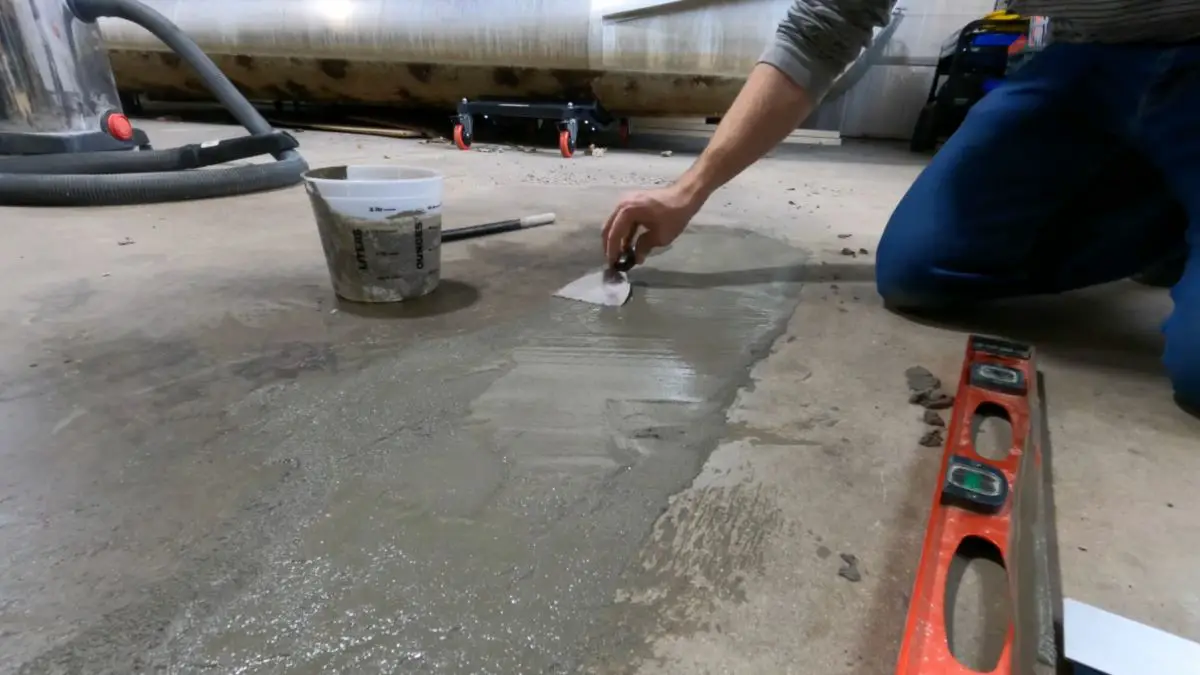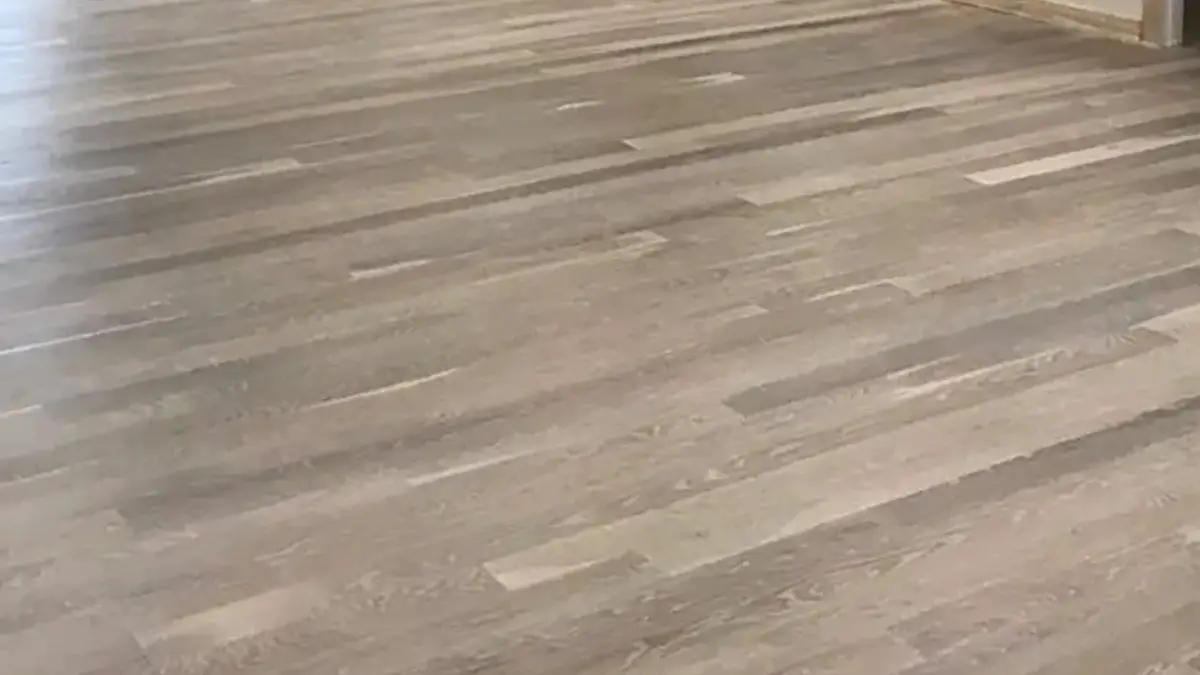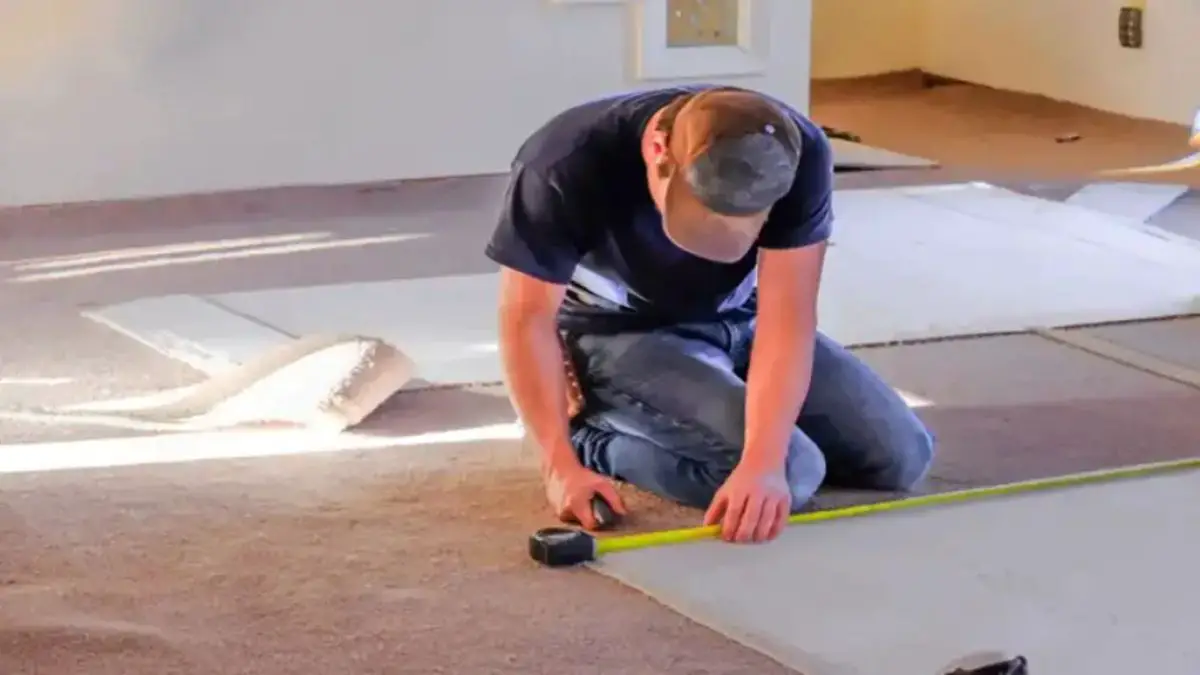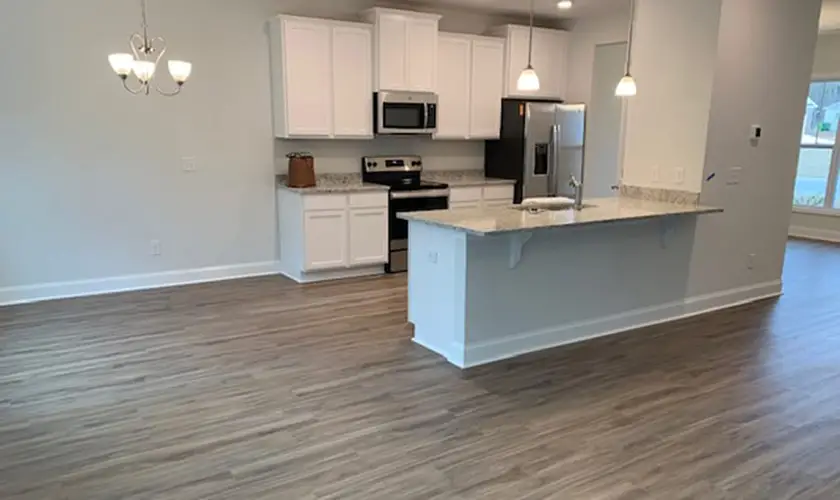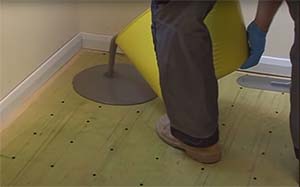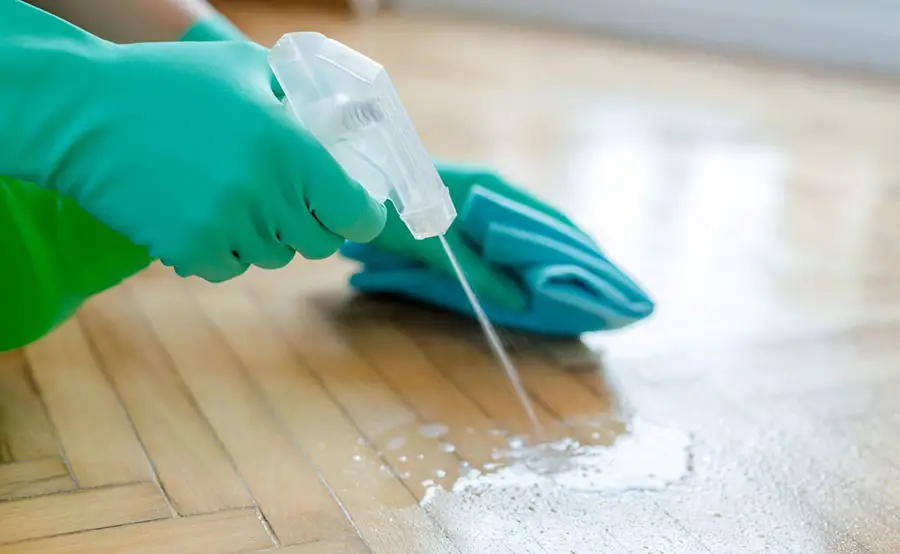
Not only do hardwood floors look amazing, but they’re also a practical choice! There are many benefits of hardwood floors, from their sheer durability to how easy they are to clean. However, they’re only easy to clean when you use the right cleaning product. Is hydrogen peroxide the right choice of cleaning product?
When used correctly, hydrogen peroxide is a safe cleaning solution to use on hardwood floors. Hydrogen peroxide efficiently removes dirt from wooden surfaces and has disinfectant, deodorizing, and stain-removal properties. Using hydrogen peroxide to clean hardwood floors is safe and cost-efficient.
In this article, we’ll break down everything you need to know about cleaning hardwood floors with hydrogen peroxide. Once we’ve looked at why hydrogen peroxide is one of the best hardwood floor cleaners, we’ll guide you through the process of using it to clean your floors!
Will Hydrogen Peroxide Damage Hardwood Floors?
When it comes down to homemade cleaning solutions that are safe to use on hardwood floors, you might be wondering about whether or not you can use hydrogen peroxide. Typically diluted with water, hydrogen peroxide is known for its bleaching and antiseptic properties.
However, since hydrogen peroxide is known for its bleaching properties, you may be worried about its suitability for cleaning hardwood floors. Well, you’ll be glad to learn that – when used correctly – hydrogen peroxide is perfectly safe to use when cleaning your floors.
The first step towards safely cleaning your floors with hydrogen peroxide is to use the correct concentration. When cleaning hardwood floors, you’ll want to use hydrogen peroxide with a 3% concentration level. You can apply it directly to your hardwood floors.
Using a more concentrated hydrogen peroxide directly on your floors could lighten the color of your hardwood floors. However, it is possible to dilute stronger hydrogen peroxide concentrations with water for cleaning purposes.
If you have the correct concentration levels and follow the directions, hydrogen peroxide is perfectly safe to use as a cleaning agent for hardwood floors. In fact, there are many benefits of using hydrogen peroxide when cleaning hardwood floors.
The Advantages of Cleaning Hardwood Floors with Hydrogen Peroxide
Before I walk you through exactly how to clean your hardwood floors with hydrogen peroxide, let’s quickly look at the advantages of using this cleaning solution!
1. Hydrogen Peroxide is an Effective Cleaning Solution
So far in this article, we’ve briefly looked at the impact certain cleaning products can have on your hardwood floors. Hydrogen peroxide is a highly effective cleaning solution. A hydrogen peroxide cleaning solution is the perfect way to remove surface grime from your hardwood floors; you can clean up anything from spills to dirt.
2. Hydrogen Peroxide Can Target Tough Stains
You may have heard about people using hydrogen peroxide to remove tough stains from their hardwood floors. This isn’t an old wives’ tale. It’s science! Essentially, hydrogen peroxide removes compounds from your wooden floors that cause stains. This further protects against damage from excess moisture in your hardwood floors.
3. Hydrogen Peroxide Functions as a Disinfectant
Earlier, we briefly mentioned the antiseptic properties of hydrogen peroxide. Well, using this chemical as a cleaning agent for hardwood floors can kill microorganisms, bacteria, and fungus present on your floors. This minimizes any health risks linked to these harmful microorganisms!
4. Hydrogen Peroxide Deodorizes Surfaces
Hardwood floors tend to absorb substances. From unintentional spills to pet urine, certain stains can smell just as bad as they look! Luckily, hydrogen peroxide not only removes stains and disinfects your hardwood floors – it even deodorizes them. Using a hydrogen peroxide cleaning agent is a great way of removing unpleasant odors from your hardwood floors!
5. Hydrogen Peroxide is a Non-Toxic Cleaning Solution
Did you know that hydrogen peroxide is completely non-toxic? There are no harmful or dangerous chemicals that are added to it. Many heavy-duty cleaning products utilize chemicals like chlorine and acids. Not only is hydrogen peroxide safe for the environment, but it’s also perfectly safe for your family and pets!
6. Hydrogen Peroxide is a Budget-Friendly Option
There’s a certain irony to using the wrong cleaning product for hardwood floors. That’s because cleaning products can often be quite costly, but they are often not very effective on hardwood floors. On the other hand, hydrogen peroxide is an affordable cleaning solution that is sure to do the trick!
7. Hydrogen Peroxide is Easy to Use
Finally, one of the best benefits of hydrogen peroxide is its sheer versatility. From your floors to your countertops to your walls, there are countless ways that you can use hydrogen peroxide around the house. Not only does using hydrogen peroxide prevent you from spending unnecessary money on different cleaning supplies, but it’s also easy to use – especially when you follow our directions!
How to Clean Hardwood Floors with Hydrogen Peroxide
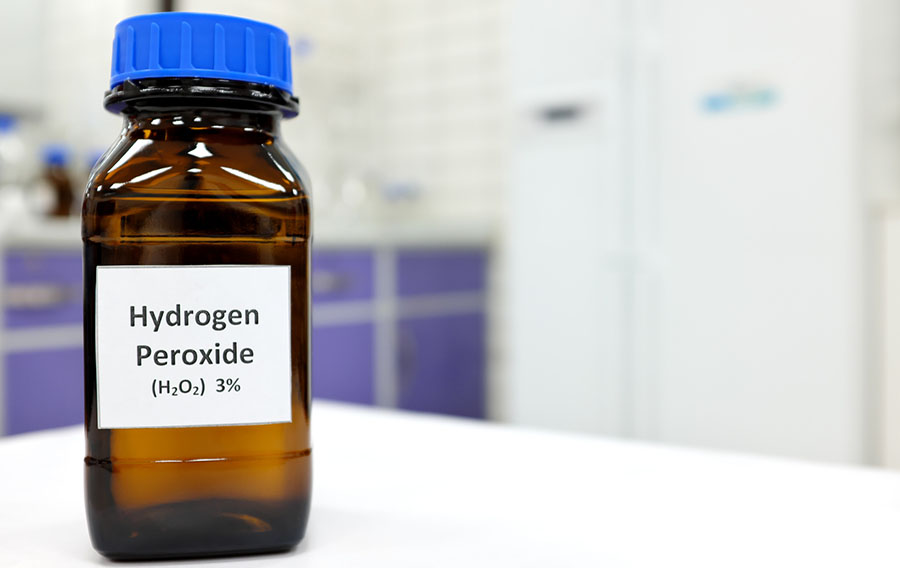
When using hydrogen peroxide to clean your hardwood floors, it’s essential to use it correctly. This will ensure that you do not damage your beautiful floors. The goal, after all, is to leave them spotless and shining!
What You’ll Need
In the list below, you’ll find everything you need to clean your hardwood floors with a hydrogen peroxide solution successfully. Once you’ve gathered your supplies, you’re ready to begin cleaning your hardwood floors with our step-by-step guide!
- Dustpan
- Broom
- Rubber gloves
- Clean water
- 3% hydrogen peroxide (to be applied directly)
- OR 35% hydrogen peroxide (to be diluted before application)
- Spray bottle
- Mop with microfiber mophead
- Microfiber cleaning pads or cloths
1. Remove Visible Dirt from the Floor’s Surface
When cleaning your hardwood floors, the first step should always be to remove any visible dirt or grime from the floor’s surface. To do this, you can use a broom and dustpan to remove any visible debris from your wooden floors.
This is an important step. When you do not pre-clean your hardwood floors, the overall cleaning process will be more difficult. Pre-cleaning will provide you with a clean working space and make cleaning your hardwood floors that much easier!
2. Prepare the Hydrogen Peroxide Cleaning Solution
Earlier, we mentioned that there are two ways to prepare your hydrogen peroxide cleaning solution. Ultimately, this depends on the type of hydrogen peroxide you have purchased. Let’s take a look at your two options!
If you’re using 3% hydrogen peroxide, you can pour this into the spray bottle you’ll be using. By doing this, you’ll be able to easily and evenly apply the hydrogen peroxide to your wooden floors.
However, if you’ve purchased 35% hydrogen peroxide, you will need to dilute your cleaning solution before applying it to your floor. To do this, mix one cup (250ml) of the 35% hydrogen peroxide to one gallon (3.8l) of clean water. Once you’ve diluted the solution, you can pour it into the spray bottle you will be using.
3. Test the Cleaning Solution
As discussed earlier, hydrogen peroxide is safe to use when cleaning hardwood floors – provided that you do it correctly. That is because there’s always the risk that the hydrogen peroxide could lighten the color of your hardwood floors when misused.
For this reason, you’ll want to test your cleaning solution in an inconspicuous area. Once you’ve bottled your hydrogen peroxide in a spray bottle, you can carry out this test. Find a small patch of your hardwood floor to test the solution and lightly mist the surface.
Once you’ve waited five minutes, you can use a microfiber cleaning pad to wipe the test area clean. You should notice that the dirt wipes away easily! However, if you notice a change in appearance, it means your hydrogen peroxide solution is too concentrated.
4. Mist the Hardwood Floors
Once you’ve tested the hydrogen peroxide solution, you’re ready to clean your hardwood floors! How you approach this step largely depends on your floor size. You’ll want to work methodically, ensuring that you clean the entire surface area of your hardwood floors.
With your spray bottle filled with the hydrogen peroxide cleaning solution, you’re ready to begin misting your floors. You’ll want to start by lightly misting a portion of your hardwood floors. Once you’ve lightly sprayed a section, you’ll need to wait five minutes until you can begin cleaning it.
5. Wipe Away the Excess Liquid
Once the hydrogen peroxide has been applied to a section of your hardwood floor, you’re ready to begin cleaning it. To do this, you’ll need to use a microfiber cleaning pad/cloth or a mop with a microfiber mop head. Which you use ultimately depends on the size of your hardwood floors!
With your microfiber cloth or mop, you’ll want to wipe away the excess hydrogen peroxide solution from the section you’re cleaning. While doing this, you must wipe or mop your hardwood floors in the same direction that the grain is going.
Cleaning in the same direction as the grain of a hardwood floor is an excellent cleaning practice. By doing this, you will actively prevent streaks from forming on your beautiful floors. Cleaning in the direction of the wood’s grain will ensure you leave your hardwood floors spotless.
While you’re cleaning your hardwood floors, you may discover a stain you weren’t aware of. The hydrogen peroxide cleaning solution is sure to remove this stain, but you may need to use more elbow grease when wiping away the excess cleaning solution.
6. Repeating Steps 4 and 5
Once you’ve applied the hydrogen peroxide cleaning solution to your floor, you will need to wait a few minutes before actually cleaning it. For this reason, you’ll need to methodically repeat steps four and five, as outlined above, to clean your hardwood floors.
Once you’ve sprayed your next section, go back to the previously sprayed section to wipe it clean. You’ll need to alternate between these two steps until you’ve cleaned the entire floor space of your hardwood floors.
How Cleaning Your Hardwood Floors Can Damage Them
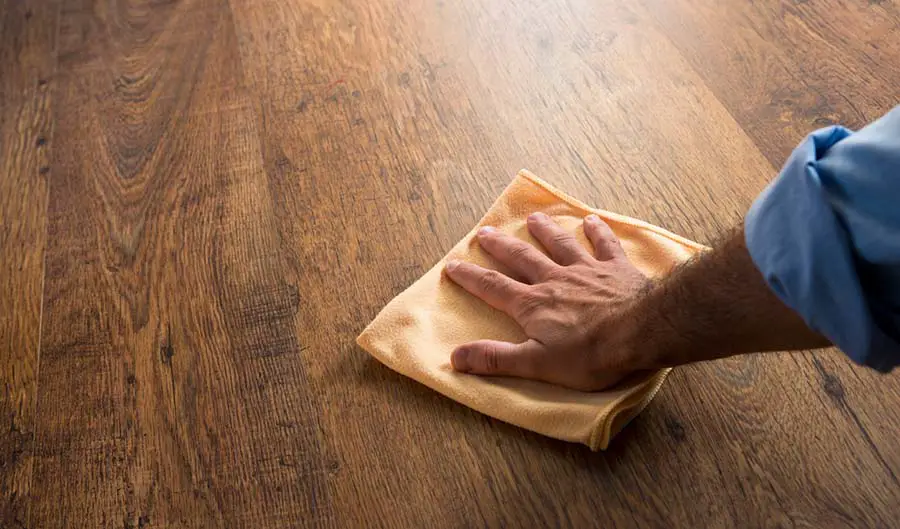
Hardwood floors have remained a trendy flooring choice. Whether you for light or dark stained hardwood floors, one thing is for sure: it’s an effortless way to enhance the aesthetic of your home. Compared to other flooring options, hardwood floors are rather low maintenance.
While hardwood floors are considered easy to clean, that’s only true when you know how to clean them correctly. There are many cleaning agents and practices that can damage your hardwood floors. The real danger, however, is that homeowners are not aware of these disastrous practices.
For example, mopping floors with water is widely considered a common cleaning practice. However, when it comes down to wet mopping your hardwood floors, you could cause the wood to swell and cause lasting damage – and we haven’t even started discussing the multitude of cleaning products available on the market today.
When it comes down to your hardwood floors, you must research the right way to clean your floors. This is especially important with this type of flooring due to the wide array of protective coatings and finishes commonly applied to hardwood floors.
The way you clean your hardwood floors ultimately depends on the sealing or finish applied to them. Do your hardwood floors have a wax coating or an oil finish? Does your hardwood floor have a polyurethane finish and, if so, is it water- or oil-based? It’s even possible that your hardwood floors are unfinished!
Many modern hardwood floors are finished with a protective polyurethane coating, protecting the floors from spills and scratches. However, certain cleaning products could negatively react with the protective coating, leaving your hardwood floors looking dull and cloudy. The longer the incorrect product is used, the harder the wood will be to clean and restore.
If you’re not already sure about the finish or coating on your hardwood floors, these are questions you should be asking. If you’re unsure about this, the best course of action would be to reach out to the manufacturer or your hardwood floors. They will be able to provide you with the relevant information.
After all, it’s no secret that hardwood floors are a costly investment to make. Due to this, you want to protect your crisp wooden floors at all costs. You’ll need to use the right cleaning techniques and a cleaning product suited to your hardwood floors to do this successfully.
Conclusion
In this article, we examined the use of hydrogen peroxide on hardwood floors. Not only is this chemical safe to use as a cleaning solution for wooden floors, but there are many advantages to using it! However, to reap these benefits, you need to use the hydrogen peroxide correctly. Luckily, we explained how to do that!


